Master of Public Health








Creating a transformative education. The School of Social Work and Program of Public Health have been consistently recognized as top-tier learning environments by our peers.









Creating a transformative education. The School of Social Work and Program of Public Health have been consistently recognized as top-tier learning environments by our peers.


As we emerge from the pandemic, our teaching, research and service with the community has proven to be more important than ever. Our faculty, staff and students have remained steadfast in our education and research mission. We have leaned into the critical goal that unites our programs of social work, public health and social policy: making the world a more equitable place.
As we begin to come together again in our classrooms and at our events, we are a community that is inspired and motivated by our innovative researchers, leading practitioners and passionate students. We stay energized by the belief that the problems we must address are complicated and multifaceted, and at the intersection of social work, public health and social policy lie the necessary, strong and sustainable solutions that advance equity.
Our work requires resilience, path-breaking research, the best available evidence and partnership with our community. Our deep engagement with the St. Louis region requires building on scientific advances developed with community-driven methods that honor the lived experiences of our neighbors. St. Louis is a diverse, vibrant community that has much to offer and is a great place for students to learn and grow.
Our work needs people like you who are not content to do things as they have always been done—people who want to make their unique, positive impact. Whether your interests lie in mental health, children, youth and families, social and economic development, research, policy, social entrepreneurship or global development, I am confident you will find your path at the Brown School. If you are motivated to create significant change in the world, we welcome you.
Sincerely, Tonya Edmond and Rodrigo Reis Interim Co-Deans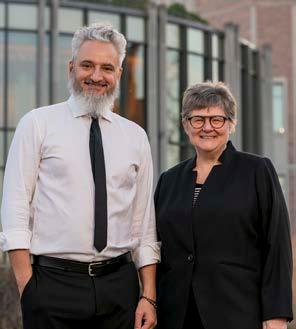
Our public health program welcomes students dedicated to advancing health equity—resulting in healthier individuals, families, communities and systems. Here, recent graduates and current students share why the Brown School was the right place to earn their degrees.
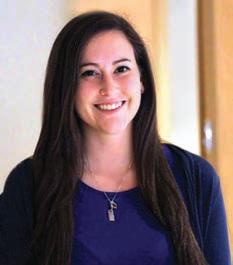
“Washington University’s partnership with BJC HealthCare made it an obvious choice for pursuing my graduate degree. The close relationship between a private research institution and a nonprofit health care organization demonstrates the positive impact that can be made through collaboration. Plus, on-campus research opportunities are accessible to students! I was able to solidify a research assistantship position during my first semester.”
—DÉJÀ MILES, MPH/MBA ’21 Commercial Leadership Program, AbbVie
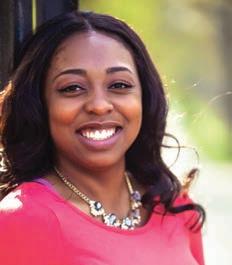
“The Brown School offered personal instruction and mentorship from established, nationally renowned experts in the fields of health economics, policy and beyond. I gained a wide range of tangible skills, from epidemiology and statistical analysis to program planning and evaluation. As well, classroom projects and student work opportunities provided the chance to practice skills in a way that would effect real change in the community.”
—LINDE PARCELS, MPH ’18 Health Scientist in Policy and Issues Management, Centers for Disease Control and Prevention
“The Brown School is a remarkably diverse space for a school of its size, and as a result I benefited from hearing a lot of different perspectives. It is also very social justice oriented and brought a lot of issues to my understanding that were previously not on my radar.”
—YUEH-YA HSU, MPH ’20 Research Associate, Innovations for Poverty Action

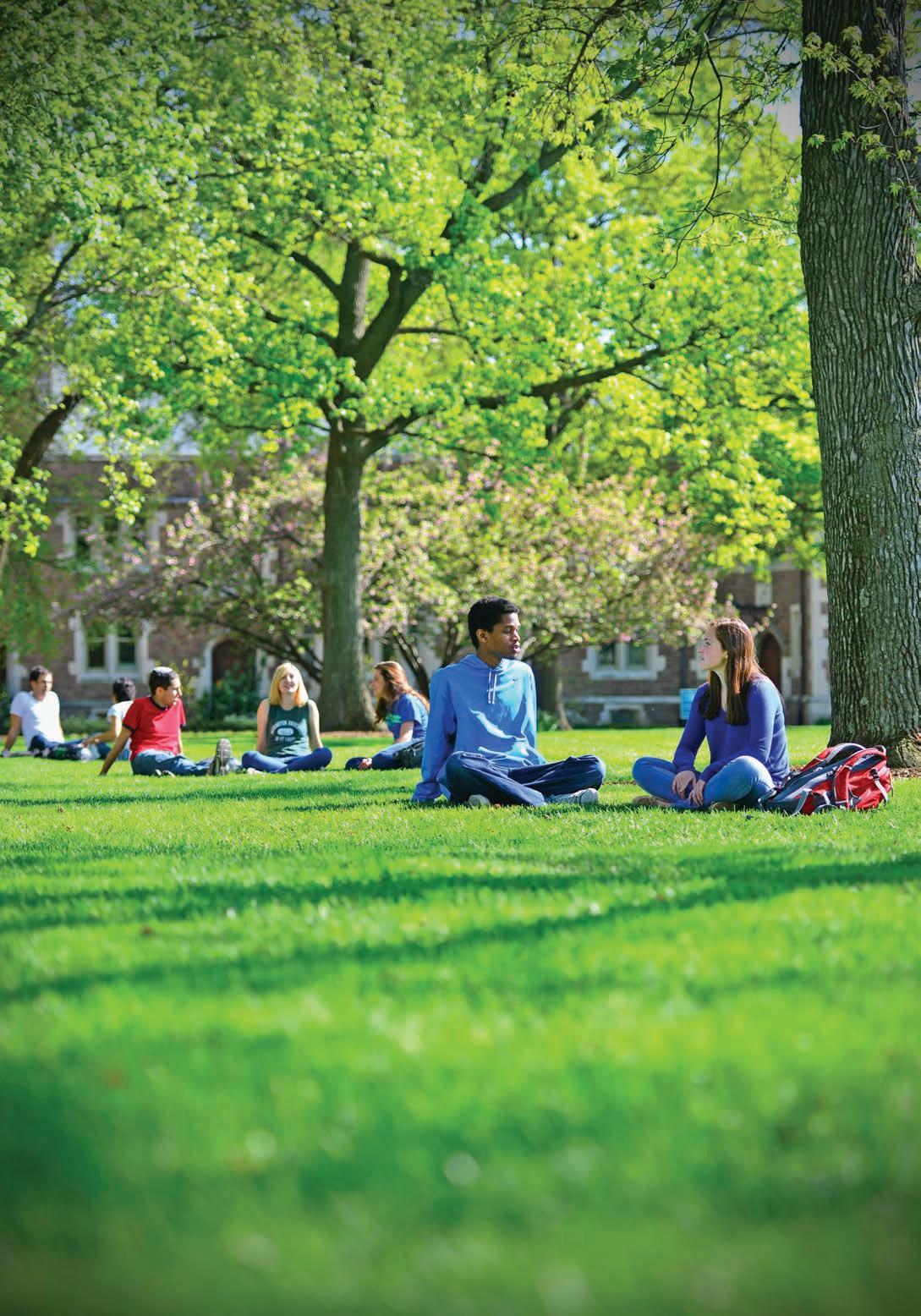
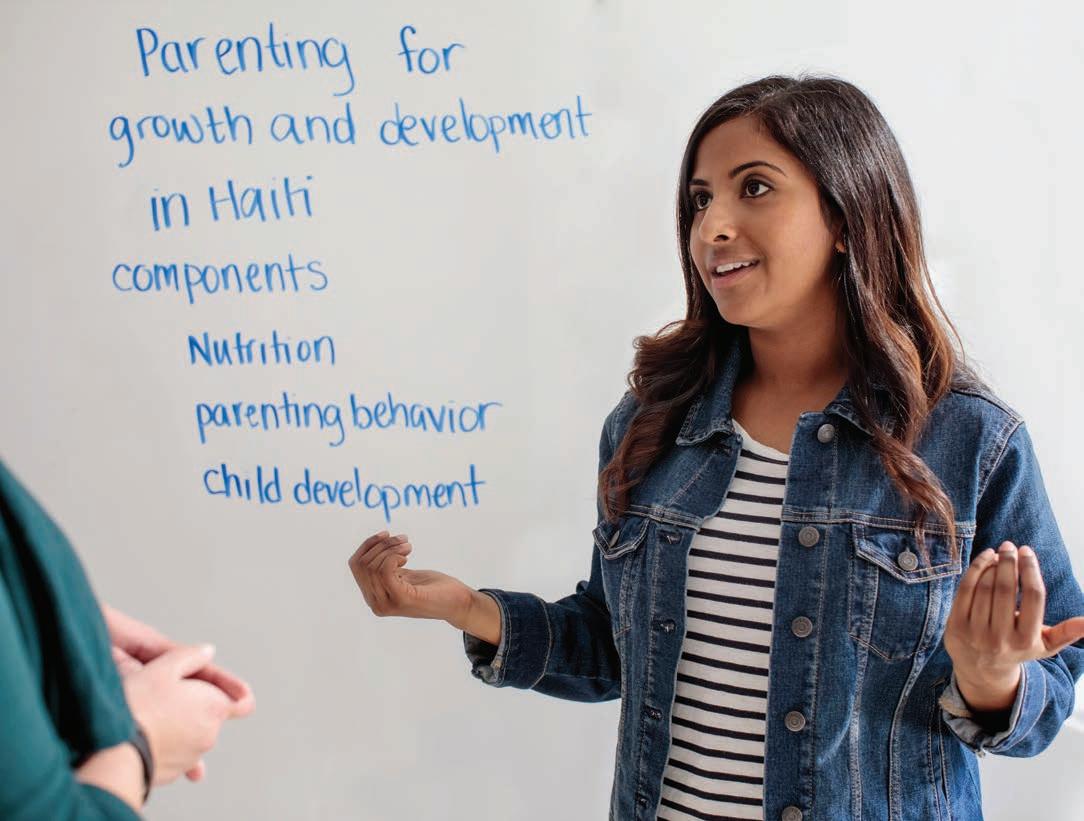

“My professors had the same mindset: heart and passion combined with evidence and science. They emphasized the connection between statistics and people and that every data point is a person. We need the data, but we’re serving the person first and foremost.”
—CALLAN HOWTON, MPH ’15 Associate Director, SAMHSA’s Addiction Technology Transfer Center
Our Master of Public Health curriculum is designed to be different. Coursework at the Brown School is distinguished by these characteristics:
A hallmark of our program is a commitment to evidence-based public health. In addition to learning theories and interventions grounded in research, you’ll learn to seek, generate and apply evidence in your own work.
A central focus of your coursework will be improving the health, quality of life and conditions of the most vulnerable populations. Brown School graduates are prepared to consider the social and economic factors that deepen health disparities.
Solutions to the most pressing public health challenges will require innovative and cross-sectoral collaborations. Through coursework focused on transdisciplinary problem solving, you’ll practice building multifaceted solutions to the most complicated public health issues.
Translation of research into real-world impact is an essential component of the public health profession. Through our curriculum, you’ll discover how to quickly and effectively implement research findings into professional practice.
We’ll equip you with skills to integrate public health frameworks and values into leadership roles across nonprofit, for-profit and government sectors. Through a series of Skill Labs, you’ll also hone high-demand skills in data analysis, statistical software programs, grant writing and organizational leadership.
brownschool.wustl.edu/mph
Our
52-credit MPH
is full time. In your first year, you will
Your second year will help you cultivate
Strong
public health
skills in a specialization of your choosing.
research.
Use
elective credits in year one and year two to complete specialization
and to enroll in additional graduate coursework. You may take electives at the Brown School or pursue relevant courses from other WashU programs.
learning in the field.
practicum at an organization
with your specialization
professional interests. Learn more about fieldwork on pages 12–13.
Our six specializations, each STEM -certified, are designed to offer academic and field-based experiences that prepare you to thrive in professional practice.
Combine specialized skills in disease investigation with data design and analysis. Looking to the horizons of health, you’ll learn to translate research into effective disease preemptions and preventions.
Examine issues in global health with attention to epidemiology of major diseases, policy implications and environmental exposures. You’ll develop a deep understanding of the conditions that promote and threaten positive health outcomes around the world.
Foster critical skills for researching, analyzing and implementing health policies at local, state and federal levels. You’ll prepare to navigate a dynamic health policy landscape in order to measure and recommend policy solutions.
As a leading cause of disability worldwide, mental health issues are a critical factor of population health. Cultivate comprehensive, holistic and culturally sensitive approaches toward mental health intervention, promotion, research and policy.
Discover how the built environment can sustain or jeopardize health, and gain the skills to leverage space in order to advance community and individual well-being. This specialization is offered in collaboration with Washington University’s Sam Fox School of Design & Visual Arts.
Draw from various specialization courses and competencies and benefit from our range of faculty expertise. Enroll in your choice of Transdisciplinary Problem Solving coursework, and choose elective credits specific to your unique professional interests.
Visit brownschool.wustl.edu/mph-specializations to explore our specializations in detail.
An Academic Advisor will be assigned to you the summer before beginning the program. With your advisor, you’ll build a plan to ensure that you take the coursework need ed to fulfill curriculum requirements.
Offered at the Brown School, a dual degree prepares you to work at the intersection of two disciplines geared toward social change:
Master of Public Health and Master of Social Work
Learn more about our dual degrees on pages 10–11.
Master of Public Health and Master of Social Policy
Joint degrees are offered in partnership with other schools at Washington University in St. Louis:
MD/MPH*, Doctor of Medicine, Washington University School of Medicine
MPH/JD, Juris Doctor, Washington University School of Law
MPH/MArch, Master of Architecture, Sam Fox School of Design and Visual Arts
MPH/MBA , Master of Business Administration, Olin Business School
MPH/MSOT, Master of Science in Occupational Therapy, Washington University School of Medicine
PhD/MPH*, Doctor of Philosophy, Anthropology, Arts & Sciences
* These
are available only to students currently enrolled in the
degree program.
Washington University undergraduate students in the College of Arts & Sciences can earn a bachelor’s degree and a Master of Public Health in a total of five years.
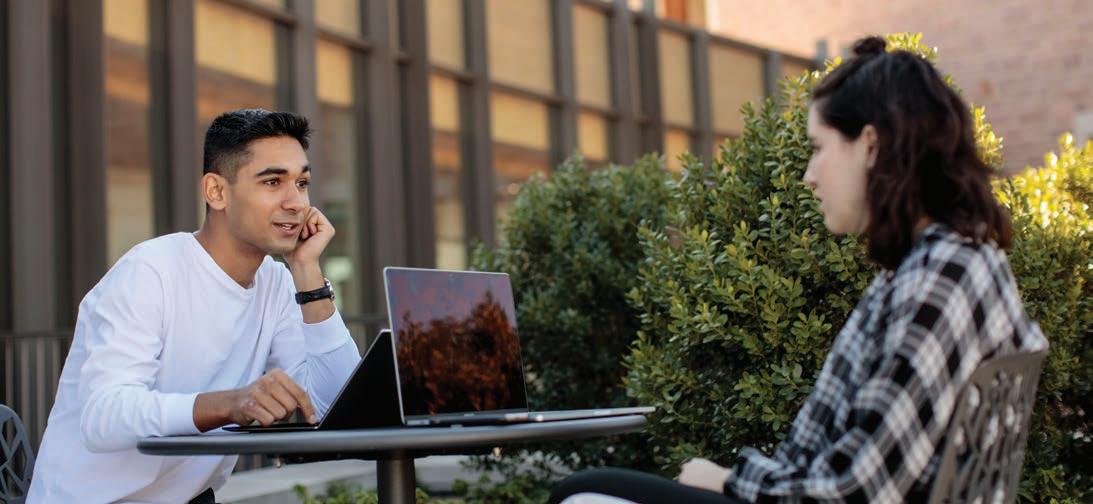
Learn more at brownschool.wustl.edu/3-2
brownschool.wustl.edu/mph
Dual-degree
two degrees from the Brown School.
pursue a
degree with a Master of Social Work (MSW) or Master of Social Policy (MSP).
has demonstrated that social and economic factors are significantly linked to health outcomes. In other words, social inequities (such as access to education, a living wage or safe public spaces) drive health
in a relationship called the social determinants of health.
the
of social
well-being of individuals and communities.
IRANI, MSW/MPH ’21
Scientist,
Control
Prevention

As a Brown School student, you have the unique opportunity to choose your own practicum site, selecting from a list of over 400 organizations.
MPH students complete one 360-hour practicum, typically during the summer after their first year.
Practicum is a foundational component of your MPH degree. Through field-based learning, you will gain the skills, knowledge and experience necessary for professional practice.
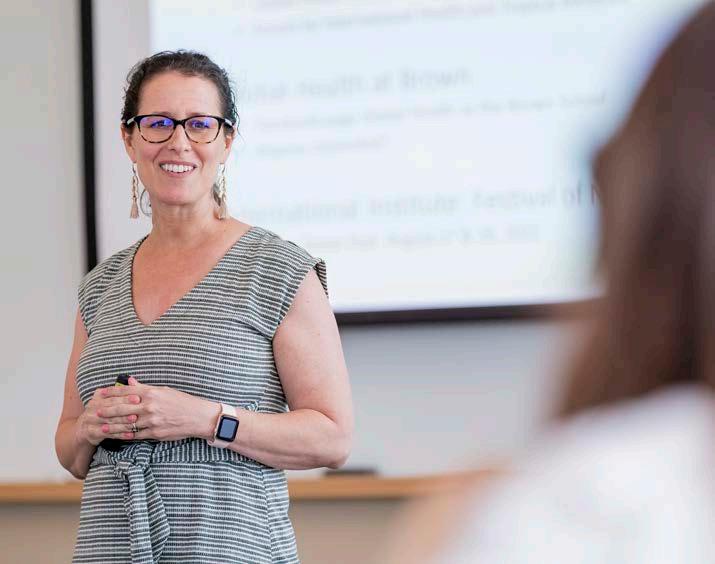
Most students complete practicum at agencies located throughout St. Louis and across the United States. Students in the Global Health specialization may pursue international fieldwork at a site curated by our Global Programs Office. Find additional information about global fieldwork on pages 14–15.
Learn more at brownschool.wustl.edu/mph-practicum
During your first year, you will have multiple opportunities to interact with field faculty who will support you in securing your practicum. As part of your second semester coursework, you will take Foundations of Field, where you will connect with field faculty and learn about field education at the Brown School. In addition, field faculty hold “advisor of the day” hours to provide support in your practicum search.
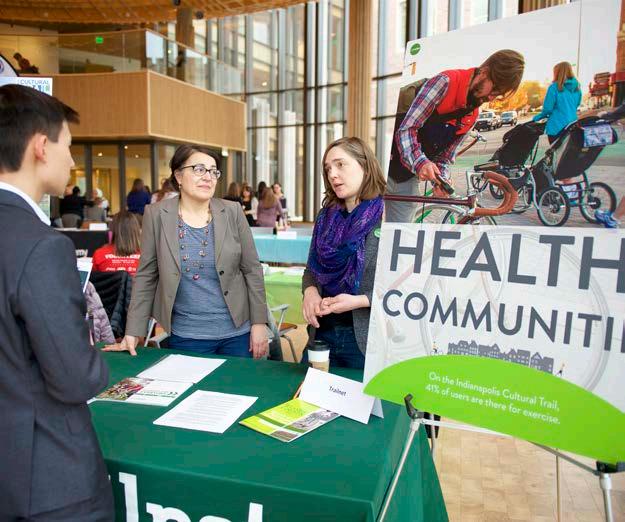
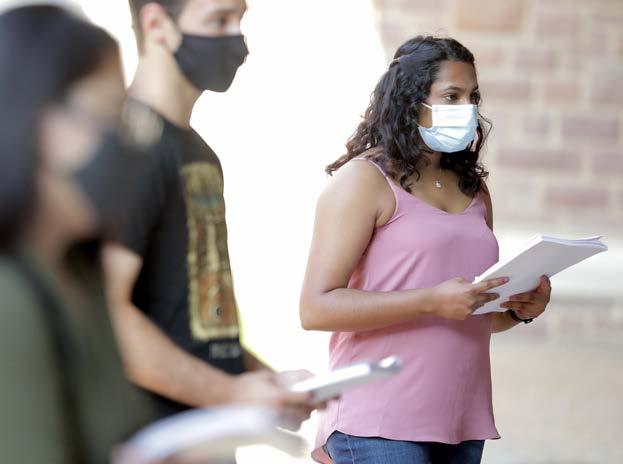
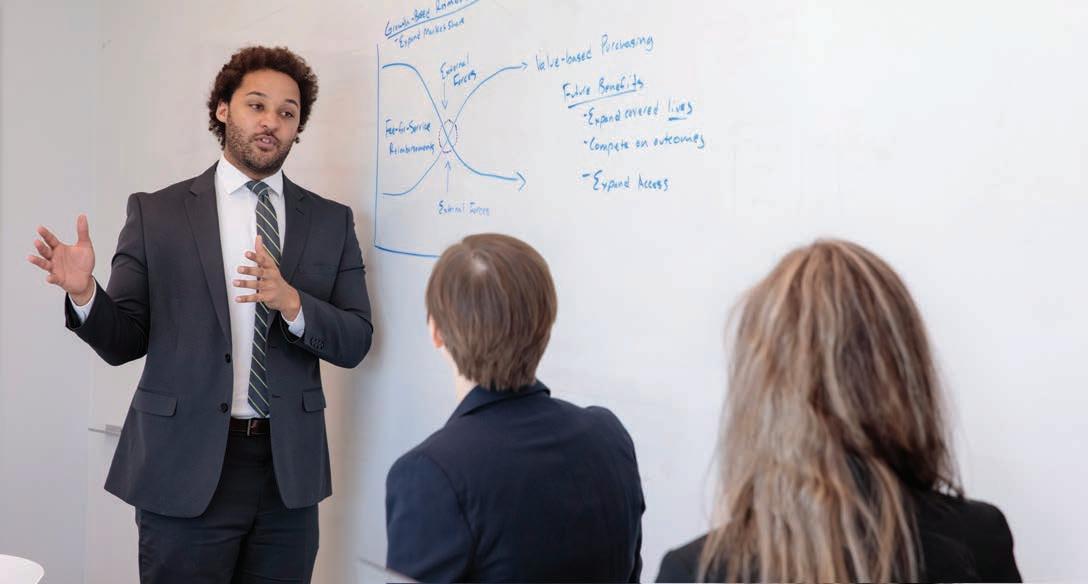
“My role as a practicum student prepared me to lead projects and programs. I was charged with designing and executing full evaluations of my site’s services, and my supervisor trusted me to take the reins. I learned how to wear different hats in different roles and how to lead according to the group with whom you are working.”
M OLLY LOUGHRAN IMMING, MSW/MPH ’18 Consultant, Quality Patient Care, BJC HealthCare

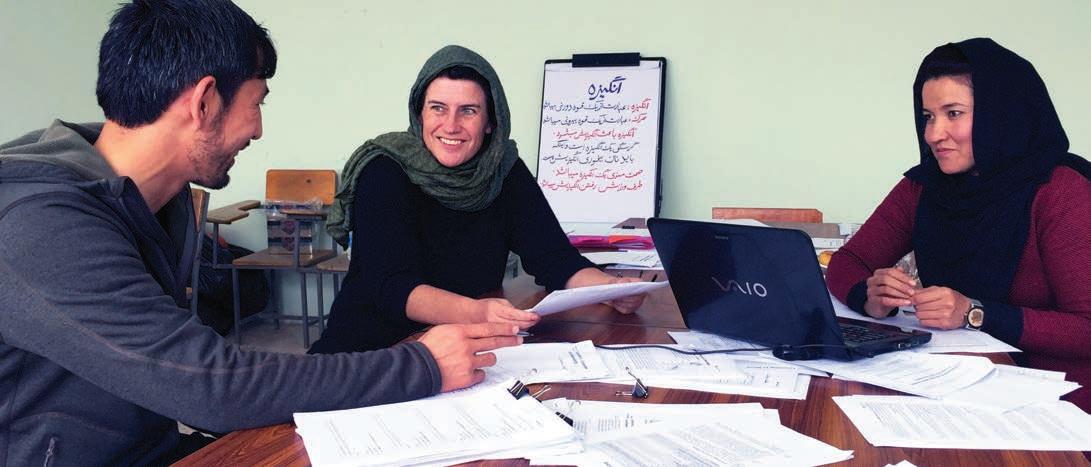
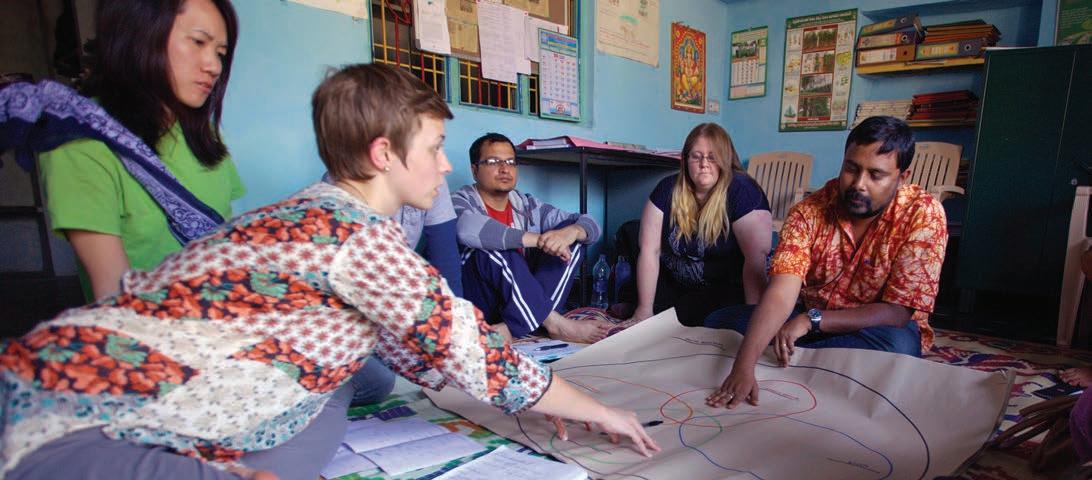
“In my field-based course, we learned so much about sustainability in such a short span of time. The chance to meet people who do this work every day was a powerful learning tool. The course truly embodied a transdisciplinary approach to problem solving.”
—STEPHANIE KERN-ALLELY, MPH ’19 Regional Communicable Disease Epidemiologist, Pacific Island Health Officers Association Completed field-based coursework on sustainability in Costa Rica
At the Brown School, we engage in research and practice around the world.
Please note: Because of COVID-19, we are carefully monitoring the safety of student travel and will work closely with those students who desire an international experience.
With guidance from our Global Programs Office, students in the Global Health specialization choose from a set of affiliated international practicum sites, such as the E3 Nutrition Lab (Haiti), the Ugandan Developmental Health Association, and The DREAM Project (Dominican Republic). International practica placements have adapted during the pandemic to include remote work options for global organizations.
Field-based coursework has taken students around the globe to explore social, health and economic challenges through a transdisciplinary lens. Open to students in all specializations, past field courses have explored sustainability, policymaking, participatory development, child labor and refugee empowerment.
Our faculty members lead international research projects, often hiring students as research assistants to partner in their work. Recently, faculty members have been investigating animalsource foods and nutrition in Haiti and Ecuador, diabetes and chronic disease in Mexico, and the psychosocial well-being of women and children refugees in the Middle East.
Learn more at brownschool.wustl.edu/global
Past field courses in Uganda, Costa Rica, Germany, Australia, Tanzania, Argentina and Washington, D.C.
brownschool.wustl.edu/mph
Our faculty members are world-renowned. Their research is on the forefront of areas such as chronic disease prevention, health policy research, health communication, epidemiology, human genetics and the social determinants of health.
Outside the classroom, faculty members engage in groundbreaking work. From conducting field research in Afghanistan to testifying on Capitol Hill and advocating with local community organizations, the passion and commitment they bring to the profession will inspire you.
Faculty also serve as your teachers, advisors and mentors. As their student, you will benefit from their dedication, their accessibility and their global network of colleagues. Meet all of our faculty members at brownschool.wustl.edu/faculty

student-tofaculty ratio
of faculty are under represented minorities
You’ll be matched with a faculty advisor, called a Specialization Advisor, whose work and teaching align with your chosen specialization. Specialization Advisors point you to the in-classroom opportunities that will enhance your experience as a student, as well as the out-ofclassroom experiences that will build your readiness for professional practice.
“At the Brown School, the attention that faculty pay to students is unparalleled, resulting in strong student resources and support for student-led initiatives. As a smaller program, our students also have the opportunity to work with faculty one-on-one in a research capacity. Through these collaborations, students receive an applied research experience, and faculty are able to mentor and shape more minds to do this important work.”
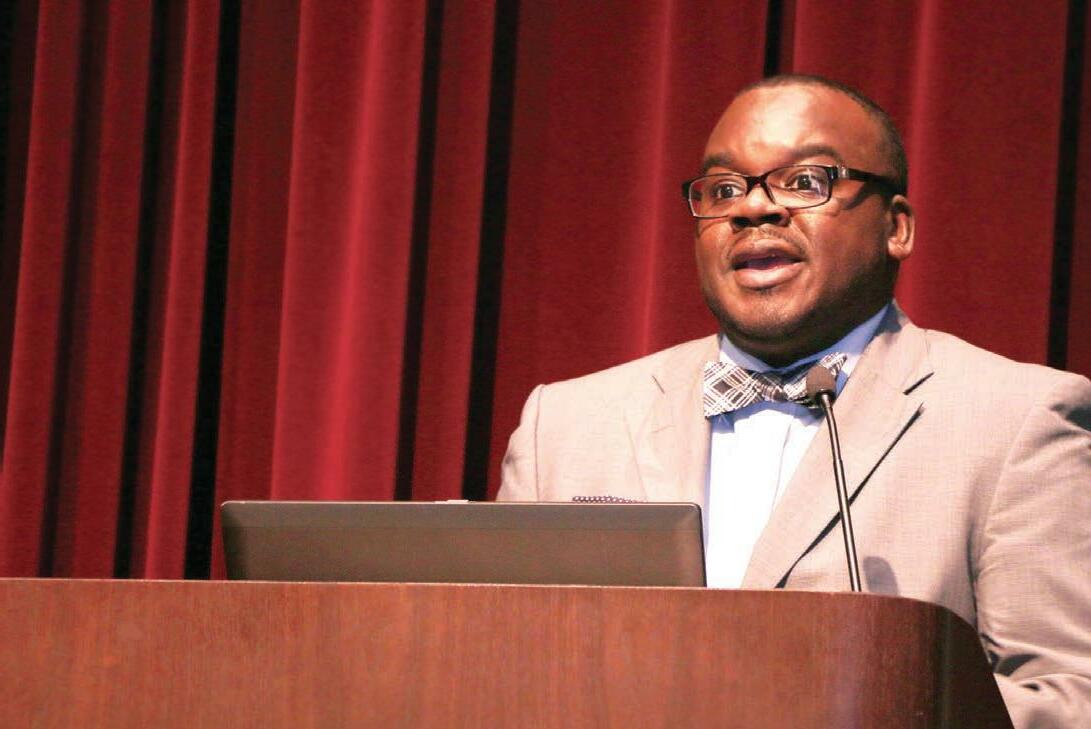
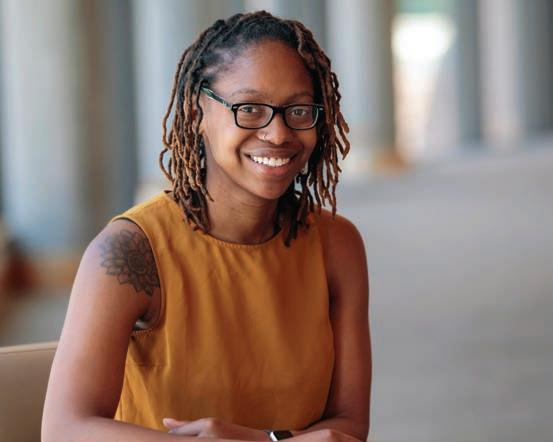

“The Brown School has a very nurturing culture. As a student, it felt like I was part of a leadership incubator that provides students the space to be challenged with realworld situations and gain the skills needed to apply theory and practice once we graduate. My faculty advisor helped me navigate the possibilities of tailoring my program to my professional interests—meeting regularly to discuss new research and potential practicum and job opportunities.”
—TAYLOR BUTLER, MPH ’19 Senior Research Manager, Health Communication Research Laboratory
—DARRELL HUDSON Associate Professor

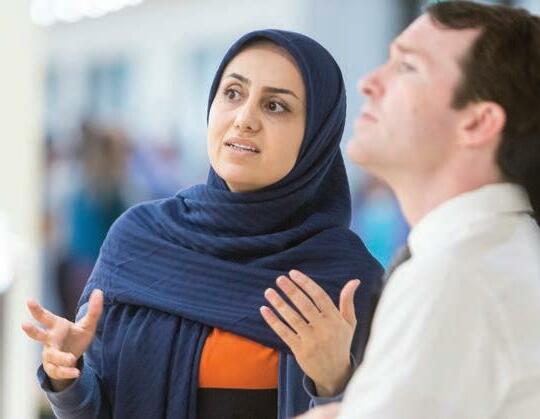
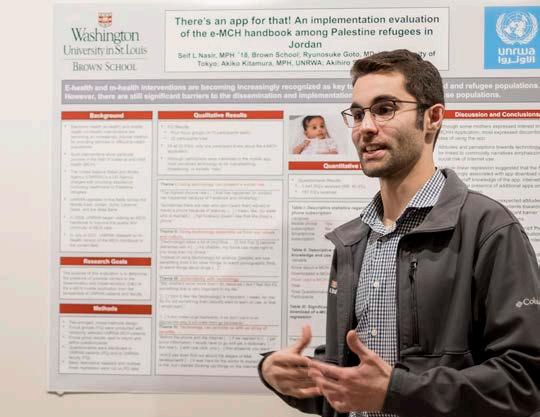
Groundbreaking research in public health, social work and social policy is conducted at the Brown School and its affiliated research centers.
Our research connects us to global health leaders, such as the NIH and CDC, to investigate disease prevention and intervention. We also know that population-level health outcomes are largely socially and environmentally determined. Is fresh food available? Are neighborhoods safe? What is the community’s exposure to trauma and toxic stress? In fact, research has shown that public health solutions that directly address socioeconomic factors—including education, housing and inequities—have the greatest potential to improve health.
For students, this research environment offers in-classroom access to the data, policies and strategies that are forging the future of these fields, plus opportunities to join faculty members in their research.
Our faculty-led research centers and institutes are focused on reducing pressing health and social inequities:
Centene Center for Health Transformation Center for Diabetes Translation Research Center for Innovation in Child Maltreatment Policy, Research and Training Center for Mental Health Services Research Center for Obesity Prevention and Policy Research Center for Public Health Systems Science Center for Social Development Clark-Fox Policy Institute
Learn more at brownschool.wustl.edu/research
Center for Violence and Injury Prevention Evaluation Center
Health Communication Research Laboratory International Center for Child Health and Development
Kathryn M. Buder Center for American Indian Studies
Prevention Research Center in St. Louis
SMART Africa Center
Social System Design Lab Social Policy Institute
Brown School students explore their research interests through research assistantships, independent studies, special projects and research-oriented fieldwork.
Each year, dozens of our students author published research papers as well as present their work at scholarly conferences. At the school’s annual research symposium, Research Without Walls, students showcase their findings for peers, faculty and community members. Learn more about Research Without Walls at brownschool.wustl.edu/rwow
brownschool.wustl.edu/mph
The Brown School and its affiliated research centers fill three interconnected buildings in the heart of Washington University, creating a comprehensive “campus within a campus” where you’ll attend classes, connect with faculty members, study and explore.
Our facilities are designed to provide what you need to make the most of your days. In addition to classrooms and student services, you’ll find a café, study rooms for group projects, a library, computer labs, and lockers and showers for active commuters.
Hillman Hall, a LEED Platinum–certified building, has been a popular venue for guest speakers, professional development opportunities and conferences. On campus, you will be well connected to experts and thought leaders in the field.
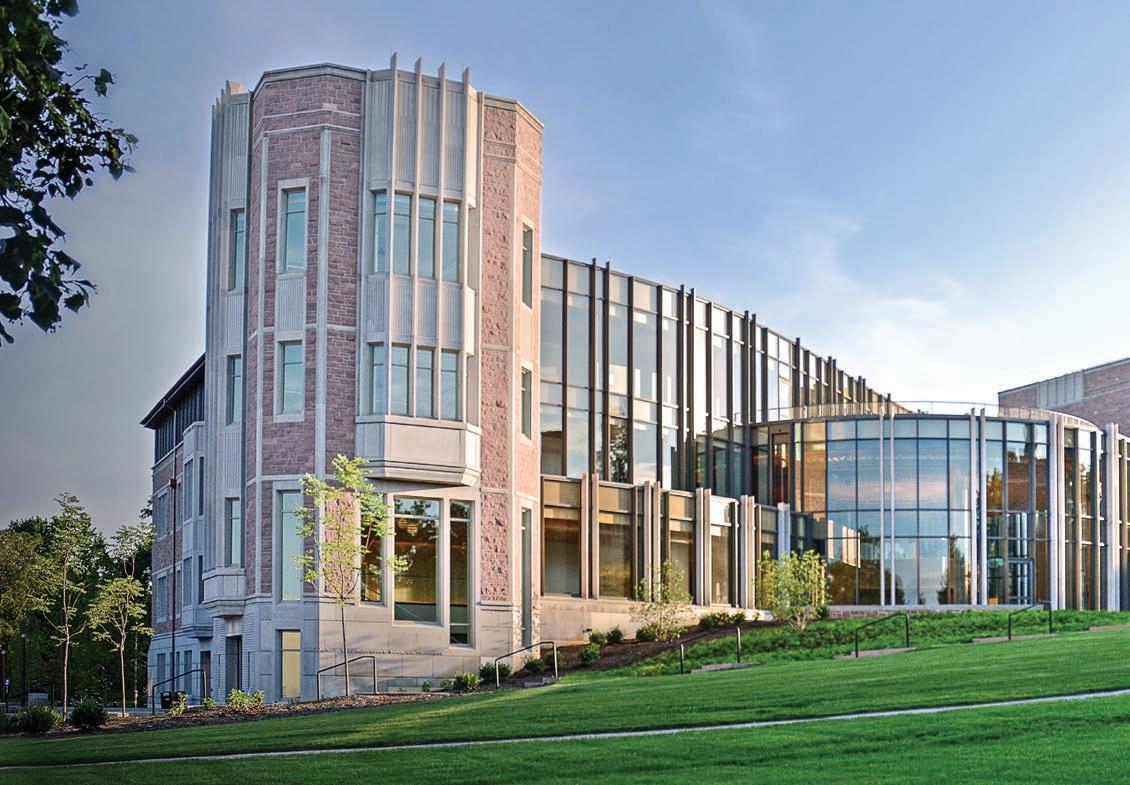
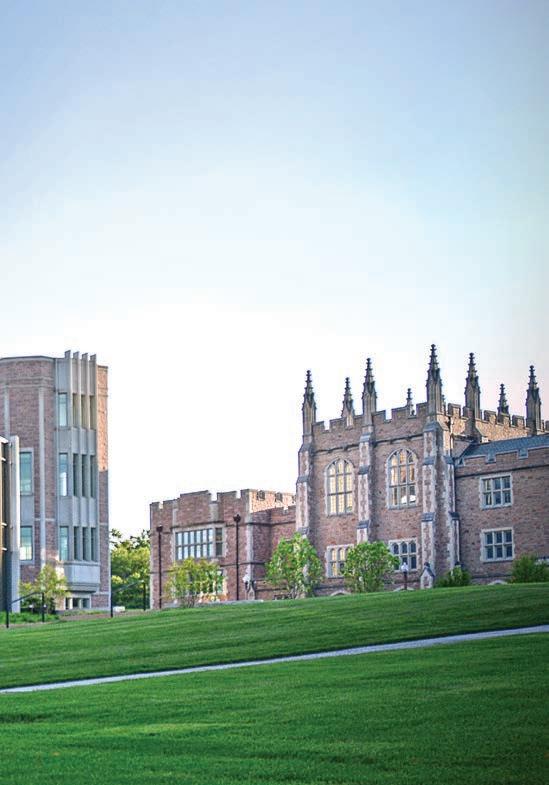
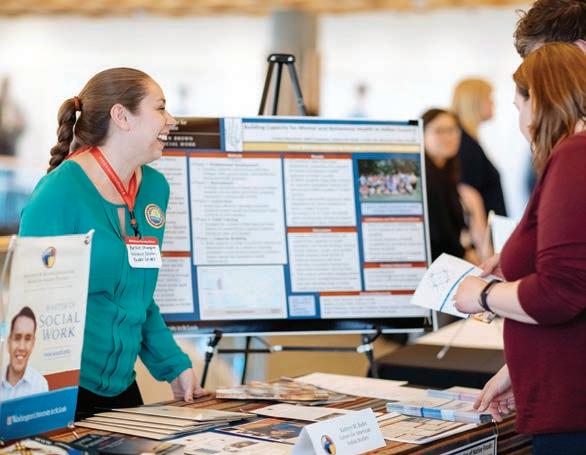
“At the Brown School, you are privileged to have so many resources and
at your fingertips. Go to as many events as you can; join a student group; do research— the
are endless.”
—ERIKA HALSEY, MPH ’18 Director of
“I was nervous about going back to school after taking a few years off. The Peer2Peer Program helped me feel more confident in myself and my work, and I was able to create a relationship with my mentor that enhanced my feelings of inclusion and connection within the Brown School. I decided to become a mentor this year in the hope of providing those same supports to incoming students.”
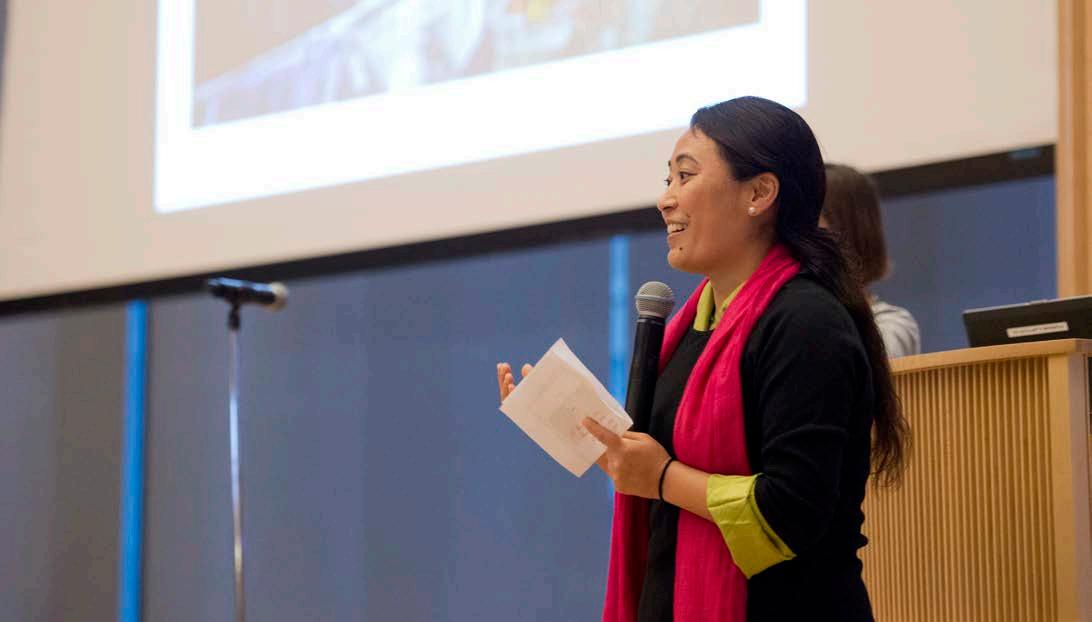

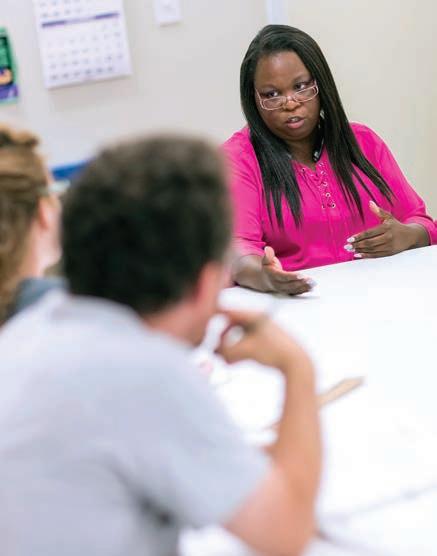
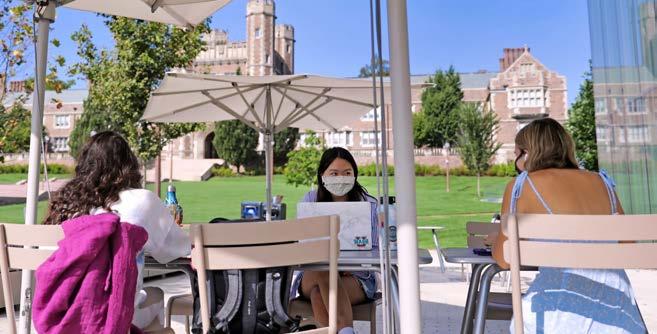
—MARA MCKOWN, MSW/MPH CANDIDATE ’23
In our welcoming environment, you’ll find comprehensive resources to support you academically, personally and professionally.
We are committed to making our School and campus welcoming to all. Our Committee for Equity, Diversity & Inclusion oversees initiatives that strengthen this focus and shares opportunities to engage and advocate for diversity and inclusion across campus and throughout this region. Learn more at brownschool.wustl.edu/diversity
Habif Health and Wellness Center Medical Services provides care for the evaluation and treatment of an illness or injury, preventative health care and health education. Learn more at https:// students.wustl.edu/medical-health-care-services/.
Our new Peer2Peer Program offers all incoming students the opportunity to match up with second- or third-year Brown School students to help ease the graduate school transition, build community and increase collective student advocacy.
Academic support resources offer one-on-one and small-group advising designed to help you thrive in and out of the classroom:
Assistance with written projects and presentations
Peer mentoring program to ease the graduate school transition
Support in quantitative assignments
Learn more about advising support throughout this viewbook, wherever you see this icon.
Workshops, webinars and training to build practice and leadership skills
Extensive collections of texts, journals and databases for research
Personalized support for your career goals
brownschool.wustl.edu/mph
We are part of Washington University in St. Louis, one of the nation’s preeminent research universities.
Here, you’ll find a community of achievers, driven to solve the most complicated issues in fields such as education, medicine, engineering and law.
Brown School students are actively involved in the WashU student community. They serve as graduate fellows in offices throughout the university, and they hold elected positions on the Graduate Professional Council. Across campus, Brown School students are recognized for their advocacy and leadership.
At our top-ranked School of Medicine and its world-class associated hospitals—Barnes-Jewish Hospital and St. Louis Children’s Hospital—MPH students complete outstanding research and practicum opportunities.
You’ll benefit from the vibrant campus life at WashU. You can choose to pursue student leadership opportunities, attend guest speaker series, see a performance or participate in a fitness class at our state-of-the-art recreation center. Whatever your interests, you’ll find plenty to do.
Learn more at brownschool.wustl.edu/washu
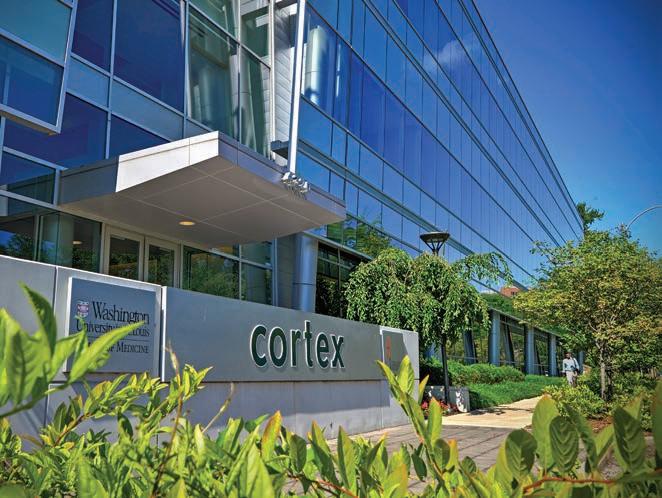
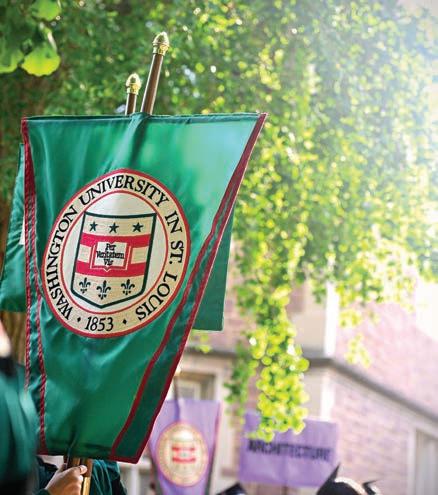
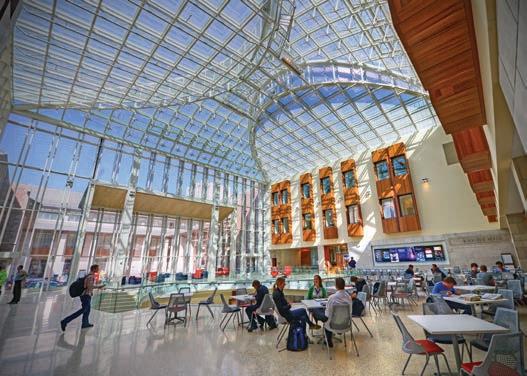
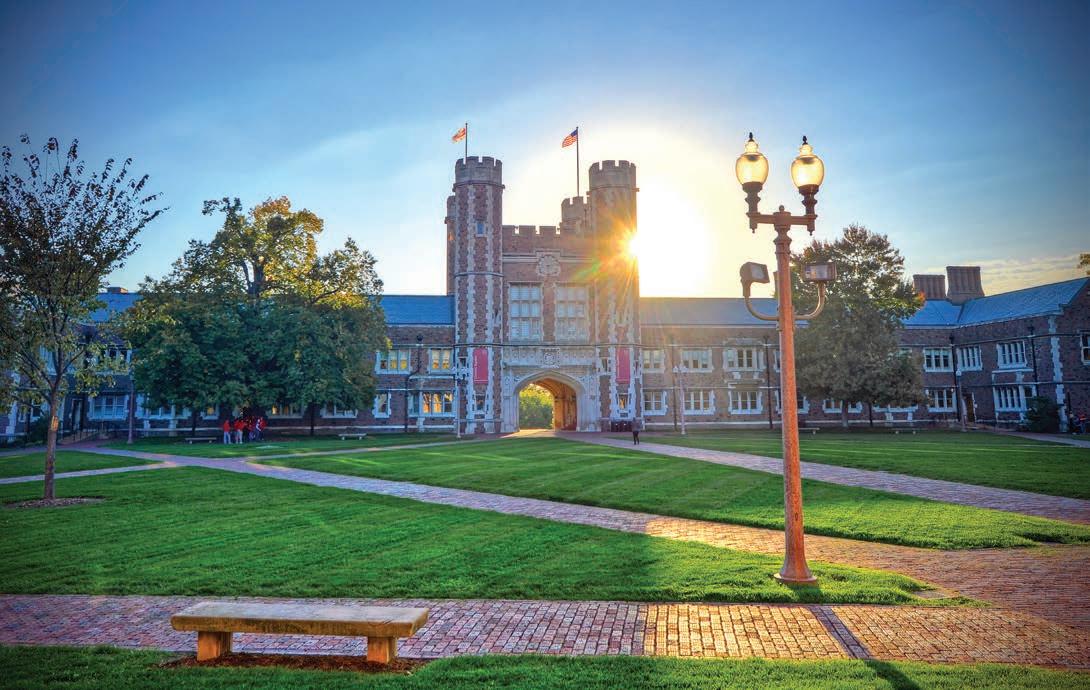
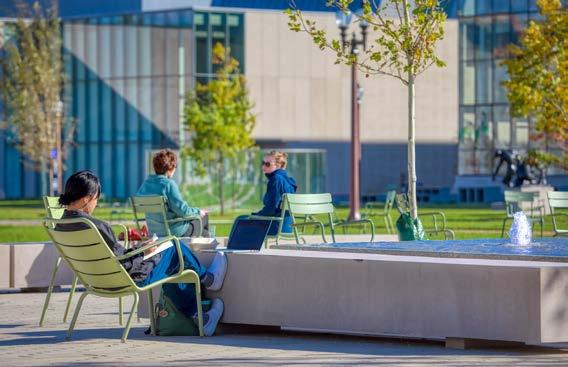
Louis is a home away from home. The people are warm and kind and will make you feel like part of a huge family. In addition, the diverse backgrounds of the people here will make the city a good fit for everyone.”
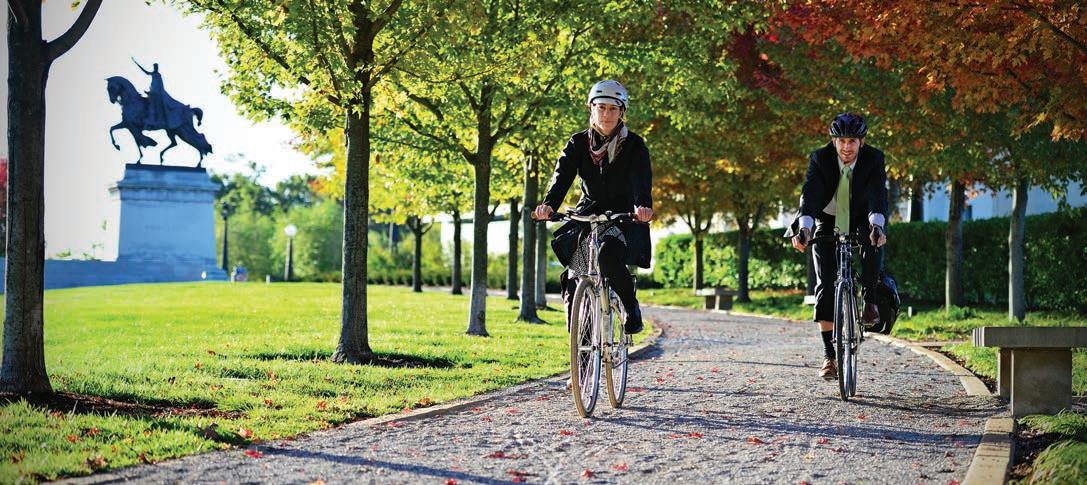



ELLEN MUKWEKWERERE, MPH
St. Louis offers big-city opportunities and a low cost of living, making it a desirable and accessible destination for students.
The city upholds a long tradition of entrepreneurism and innovation, serving as a headquarters for start-up hubs, Fortune 500 companies and one of the nation’s best health care organizations.
Free museums, eclectic award-winning restaurants, and a world-class orchestra and music scene anchor the city’s cultural vibrancy.
Across the street from campus, you’ll find Forest Park. A crown jewel of St. Louis, this awardwinning urban park offers 1,300 acres you can explore by bike, foot, pedal boat or paddleboard.
Forest Park is also home to many of the city’s free, world-class museums, its renowned zoo and Muny Opera, as well as signature community events.
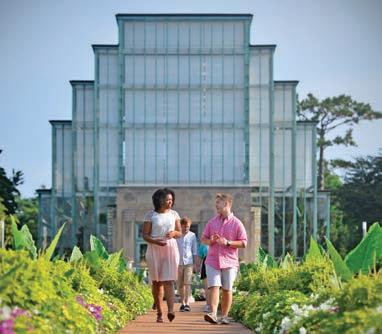
Keep exploring our great city, where there is so much to discover and enjoy.
Learn more at brownschool.wustl.edu/STL
We are Washington University in St. Louis, for St. Louis and with St. Louis.
The Brown School is an active partner in creating healthier and more prosperous communities in and around St. Louis. We work and advocate with external community organizations that are addressing structural inequities, health disparities and resource deficits throughout the region. Our faculty members have also launched several community-based initiatives:
HOMEGROWN STL AND THE RACE & OPPORTUNITY LAB, led by Sean Joe, the Benjamin E. Youngdahl Professor of Social Development, bolster the city’s capacity to foster positive social, physical and educational development of Black boys and young men. Recent work after the death of George Floyd has included a report, “Accountable Policing: Policies to Advance the Personal Safety of Black Boys and Young Men,” which provides both local and federal recommendations to alter public safety practices for equity, accountability and transparency.
THE CENTER FOR HUMAN SERVICE LEADERSHIP (CHSL) was developed to support the capacity and leadership of nonprofit tenants at Delmar DivINe, a new real estate initiative in North St. Louis City dedicated to community development, social improvement and collaboration in St. Louis and the nation. Directed by Professor of Practice Barry Rosenberg, CHSL will use a racial equity lens to contribute to the long-term development of social service organizations, assisting in organizational governance, data-driven strategic thinking, innovation, talent development and collaboration.
Within our community initiatives, you will find opportunities for practica placement, research positions and informal learning events held throughout the year.

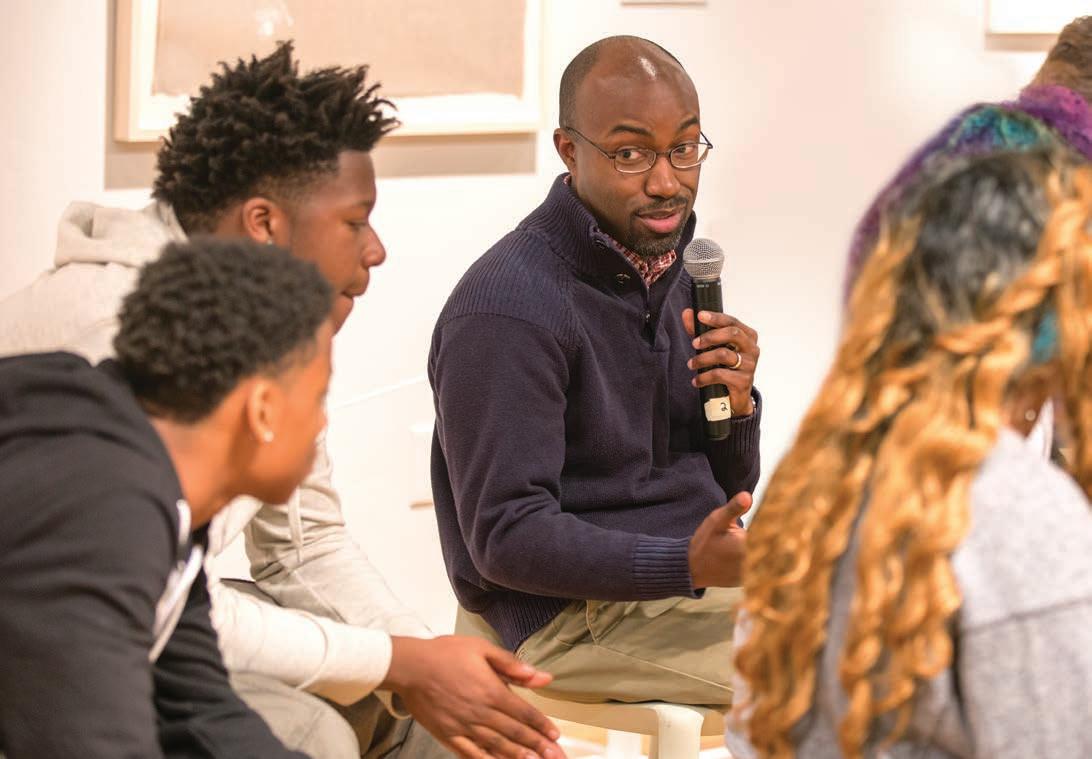
“I credit this city and the people in it for influencing my worldview and values. Amazing community-level, intersectional work happens here. From the Black Lives Matter movement to local politics, to queer artists and organizers, there are so many ways to plug in. The folks who are already here doing the work are full of passion, hope and a vision for what an equitable city can look and feel like.”
M OLLY PEARSON, MSW/MSP ’20 Independent Educator, Consultant & Organizer
“I don’t think there has been a more important time for the Brown School to be engaged in the type of work we’re doing.”
—JASON PURNELL Associate Professor and Vice President of Community Health Improvement, BJC.
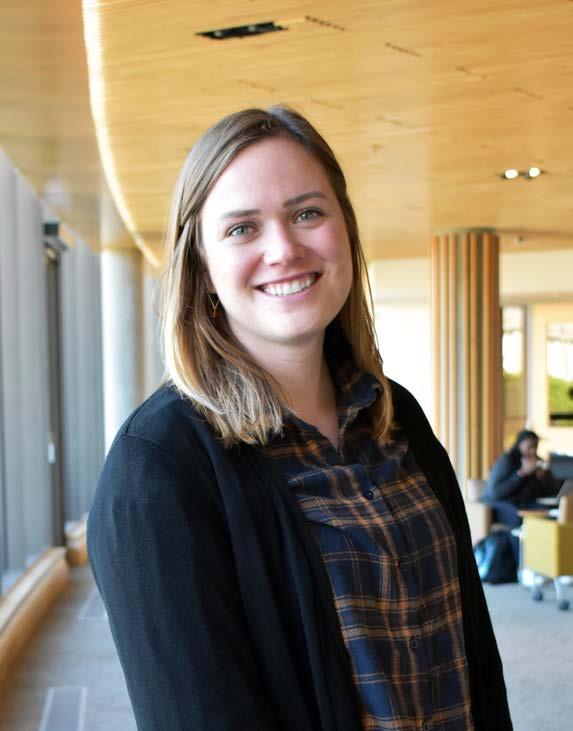
9:00 am Remote Research Assistantship at Institute for Public Health
12:00 pm Eat Lunch and workout
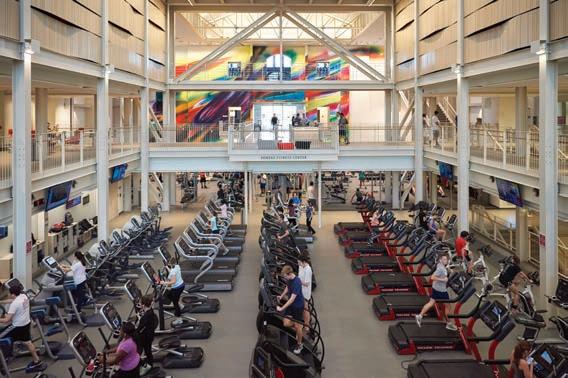
1:00 pm Group meeting for Planning, Implementation, and Evaluation Project on sexual health education in rural Illinois
3:00 pm Meet with RA Supervisor
8:00 am Walk dog, eat breakfast, and bike to campus
9:00 am Student Ambassador Shift
12:00 pm Brown bag lunch on campus with friends in Goldfarb Courtyard
1:00 pm Class: Planning, Implementation, and Evaluation (PIE) Class with Jessica Levy
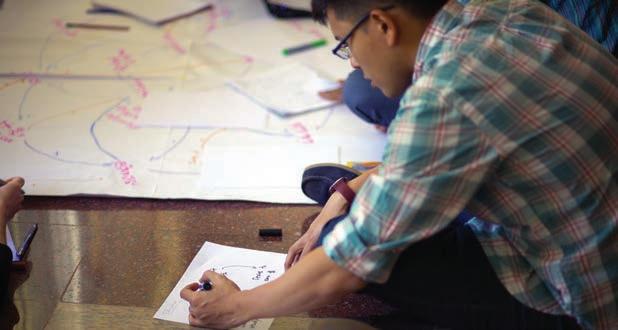
4 PM Meet with Stat Lab Tutor for help with Rstudio and project for Advanced Data Analysis
9:00 am Student Ambassador Shift – Meet with prospective students over Zoom
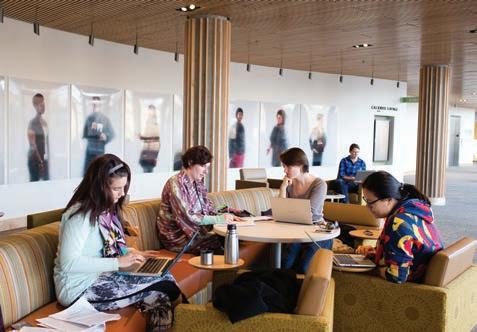

12:00 pm Eat lunch at Schnucks Pavilion
1:00 pm Class: Advanced Data Analysis (ADA) with Kim Johnson
5:00 pm Workout class and head home
Fridays
9:00 am Catch up on homework and readings for next week
2:00 pm Debate preparation for Climate Change and Public Health class on wind energy
5:00 pm Meet up with friends in the Grove
“I attended several Career Services events related to building my brand, networking, résumés, cover letters and salary negotiation. The team was always available when I needed them. They helped review my résumé when I was looking for a practicum as well as prepped me for the interview that secured my first job post-graduation.”
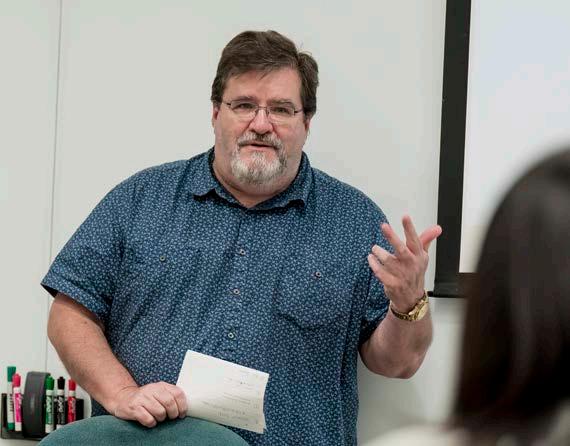
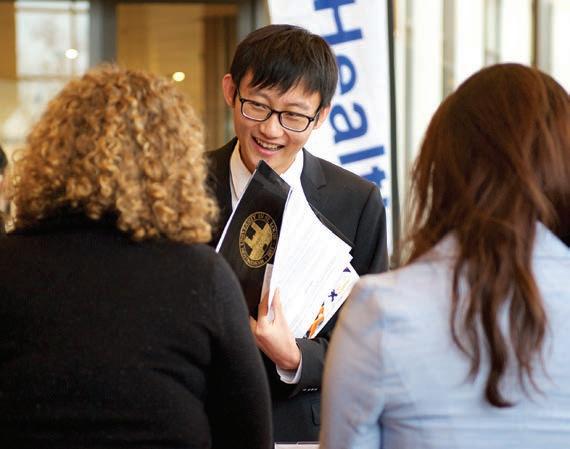
—MONICA VILLARRUEL, MPH ’19 Research Scientist, California Department of Public Health
We have a global network of alumni who are making an impact in a broad range of careers. They are valued for their leadership and vision in professional positions such as:
Health communication specialists
Research project managers
Epidemiologists
Policy analysts
Program managers and evaluators
Health care providers
Infection prevention specialists
Global health program managers
Statistical analysts
Strategic planners
Project coordinators
Local health officers
Our alumni are also competitively positioned for prestigious fellowships and doctoral programs.
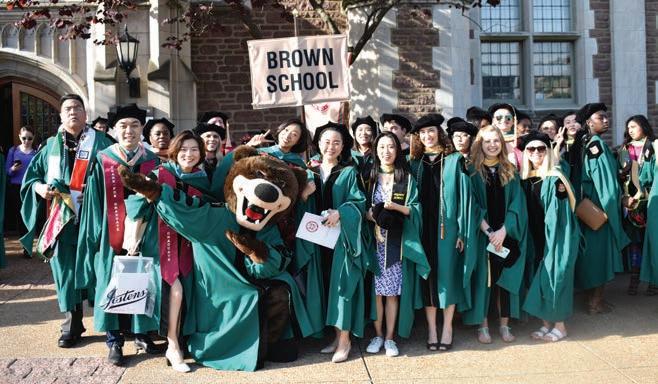
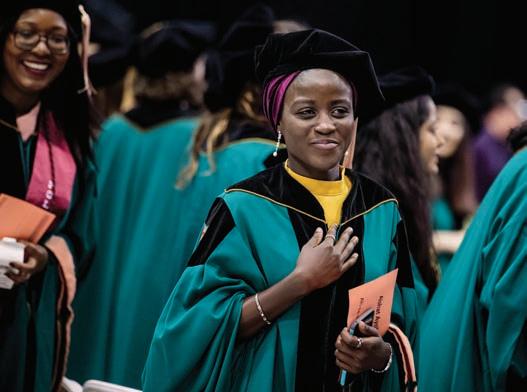
“In my current capacity as a PhD Candidate, I am working to help elucidate the relationship between the different agents in the pharmaceutical sector in the US. The Brown School provided an excellent foundation for data analysis and evidence-based public health.”
—SARAH KANG, MPH ’21 PhD Candidate, Pardee RAND Graduate School
The Brown School admits one class each year for the fall semester. Applicants are strongly encouraged to apply early.
Deadline Type Application Submission Date
Admissions & Scholarship Decisions Released
Candidate Response*
Priority Consideration December 1 February 1 May 1
Regular Decision December 2–March 1 Within 6–8 Weeks May 1
Rolling Admissions March 2–July 1 Within 4–6 Weeks
*Some scholarship offers may require accelerated responses from candidates.
Date varies by applicant
The MPH application must be submitted online through the Schools of Public Health Application Service (SOPHAS) at sophas.org
The MPH application must be submitted with the following items:
SOPHAS application fee
Academic transcripts from all postsecondary institutions attended A personal statement
A comprehensive résumé or CV Three letters of recommendation
Supplemental materials are required for international students, transfer applicants and 3-2 applicants.
Additional information is available at brownschool.wustl.edu/mph-apply
We know how important scholarship support can be in making graduate school a possibility. The Brown School offers a range of scholarships to assist students with funding their degrees. Brown School scholarships include a combination of merit- and need-based awards that recognize the variety of strengths, experiences, endeavors and personal histories our students offer. The admissions committee considers several factors in determining scholarship awards: financial need, academic achievement, leadership and service, professional accomplishments, contributions to family and community, and commitment to equity and advancing public health through social justice.
All applicants wishing to be considered for Brown School scholarship support will receive an award. A supplemental scholarship form and a video interview are required; instructions will be issued after submitting the application for admission. Learn more at brownschool.wustl.edu/ mph-scholarships
The Brown School Office of Financial Services provides dedicated support to students as they navigate the financial aid process. Most students finance their graduate education through a combination of sources, including Brown School scholarships, external scholarships and grant programs, federal funding (student loans and work-study), part-time research assistantships and campus-based employment, private loans, personal savings, and out-of-pocket payments. The Office of Financial Services is available to assist as you determine which funding strategies will work best for you and your individual circumstances. Learn more at brownschool.wustl.edu/mph-finaid.
brownschool.wustl.edu/mph

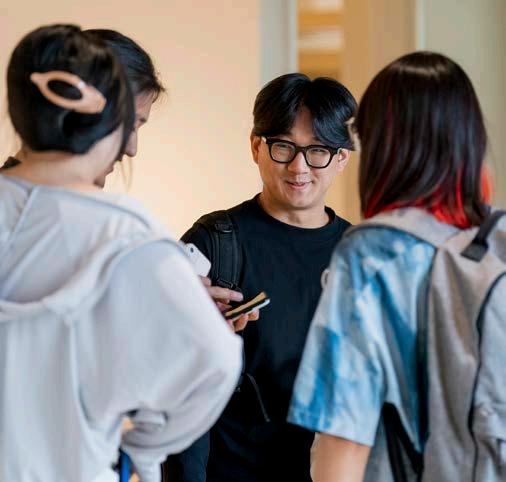
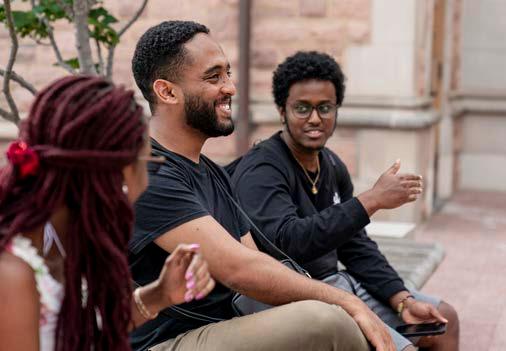
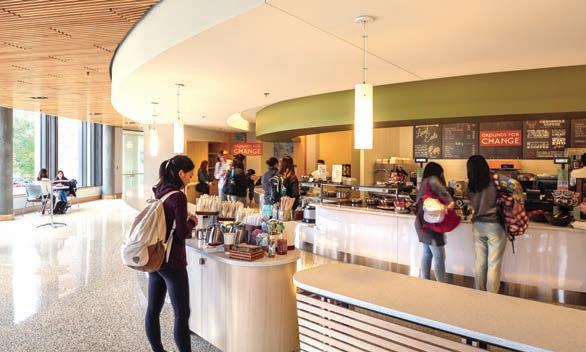
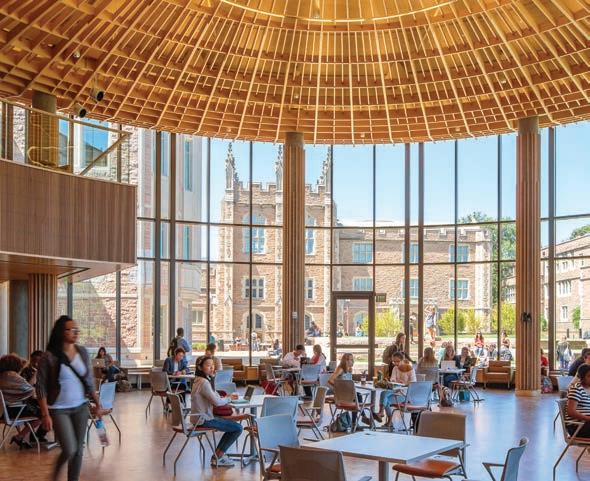
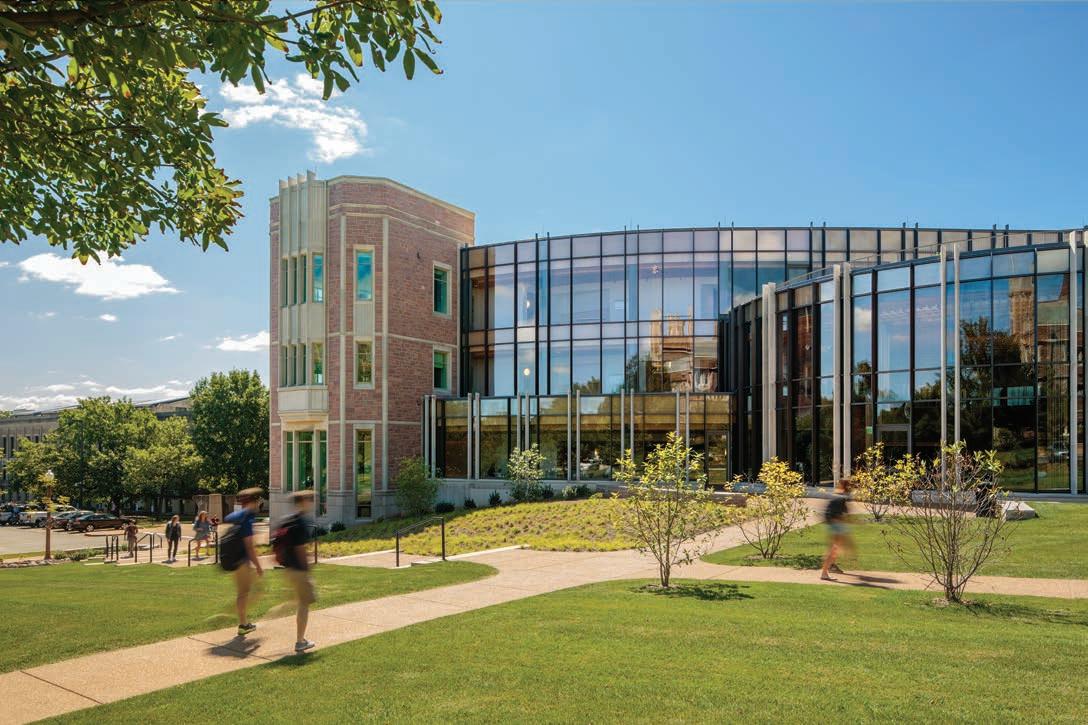
We love helping prospective students get a better feel for our programs, campus and community.
Schedule your virtual or in-person visit at brownschool.wustl.edu/visit .
Learn about other ways to explore our community at brownschool.wustl.edu/virtual-connections
The Office of Admissions & Recruitment hosts monthly virtual info sessions on topics spanning research, faculty, field education, tips for submitting a strong application and others. Each session concludes with a Q&A for viewers. Learn about our next sessions at brownschool.wustl.edu/virtual
We welcome you to call or email with your questions about the Brown School or the application process. To meet the admissions team, visit brownschool.wustl.edu/meet-admissions
CONTACT US Office of Admissions & Recruitment 314.935.6676 brownadmissions@wustl.edu brownschool.wustl.edu
Washington University encourages and gives full consideration to all applicants for admission, financial aid and employment. The university does not discriminate in access to, or treatment or employment in, its programs and activities on the basis of race, color, age, religion, sex, sexual orientation, gender identity or expression, national origin, veteran status, disability or genetic information. Inquiries about compliance should be addressed to the University’s Vice Chancellor for Human Resources, Washington University, Campus Box 1184, One Brookings Drive, St. Louis, MO 63130-4899, 314.935.5990.
brownschool.wustl.edu/mph
A better and more equitable society.
To engage multidisciplinary faculty, staff and students to create a better and more equitable society through leading rigorous science, transformative education and authentic partnerships.
Excellence in education and scholarship
Immerse students in an evidence-based learning experience with faculty who are driving new solutions to contemporary social, health and structural challenges in society. Connect students with practitioners who are leading efforts to address the root causes and consequences of inequities.
Create an environment for students to co-create knowledge by collaborating with faculty on research studies and bringing innovations into practice.
Generate rigorous, innovative and high-impact scholarship to build an evidence base vital to solving real-world problems. Guided by the highest ethical standards, forge and strengthen inclusive, authentic and multidisciplinary collaborations to move high-quality applied research into practice and policy.
Develop authentic community partnerships that are based on
transparency and mutually empowering relationships that are focused on achieving sustainable change in service of the public good.
Promote equity, racial and social justice through fair, inclusive,
and sustainable practices and processes. Aspire to be catalysts for change and transformation, identifying barriers and co-creating solutions that will lead to greater justice.
Founded in 1925, the George Warren Brown School was named with a generous gift from Betty Bofinger Brown in memory of her late husband.